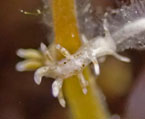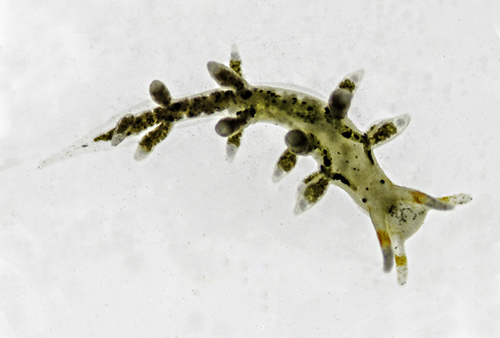| Home |
| Acknowledgments |
| Conventions |
| Glossary |
| Maps |
| References |
| Links |
| Articles |
| Thumbnails |
| Species
list |
| Family |
| Next
species |
Additional Photos

detail

2nd animal

Eubranchus sp. #8

| Maximum size: 3 mm. Identification: This species has a translucent-cream body with blotchy, olive-brown pigment running along the margins of the notum and extending into the cerata. There are also a few darker-bown spots. The tips of the cerata are cloudy-white and lack the transparent "windows" characteristic of Eubranchus sp. #2. The rhinophores and cephalic tentacles have medial orange bands and cloudy-white tips. White pigment on the notum is irregularly distributed and granular though it may be more diffuse in the center. Natural history: Eubranchus sp. #8 is known from two animals. The 1st was found on algae collected by Cecile Walsh on the Big Island. It showed a diurnal activity pattern when held (Daniel Jennings-Kam, pers. com.). The 2nd was found in a tide pool on Maui. Distribution: Big Island and Maui. Taxonomic notes: It was first recorded in Hawaii from the Big Island by Cecile Walsh and Daniel Jennings-Kam on Sept. 1, 2014. Although the overall "gestalt" seems closer to Eubranchus, there's some chance that this species could turn out to be a Tenellia or Tergipes, instead. (Note 1) Photo: Daniel Jennings-Kam: 3 mm: found by Cecile Walsh, Big Island; Sept. 1, 2014. Observations and comments: Note 1: It's also possible that the two animals could turn out to be different species. The grayish appearance of the cerata and rhinophore tips in the first can be attributed to lighting. However, if it's actually pigment, instead, that might argue for splitting... |
| Thumbnails |
Species
list |
Family | Next species | Top |